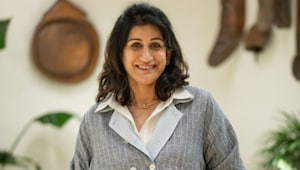
Get, set, go(ld): Parul Chaudhary on becoming one of India’s top steeplechase athletes
The athlete spoke to Cosmo India about running a steeplechase, dealing with pressure, and more.

The world’s centre stage of sports, the Olympic Games brings together the world’s finest athletes to showcase their skills and determination. Now India has produced diverse talents in sports like hockey, wrestling, and boxing on this international stage. However, track and field events have been particularly challenging with few Indian athletes reaching the top. Parul Chaudhary, born and raised in Uttar Pradesh, stands out in that field. The athlete specialises in the 5000m steeplechase, an event that involves a combination of speed, endurance, and agility. Her journey from modest beginnings to becoming one of India’s top steeplechase athletes is a testament to her dedication and passion for the sport.
In a conversation with Cosmo India, Chaudhary talks about her journey, running for the first time, focusing solely on steeplechase, and more.
Cosmopolitan India: What got you interested in running?
Parul Chaudhary: I come from a very small village near Meerut. As a child, I didn’t know much about sports. But one day, when my father asked if I would participate in a school race, I said yes. I ran 800m for the first time that day and won the race. After that, the school board told my parents that I would do well as an athlete and that I should be put into training. I didn’t know I wanted to pursue sports at the time. I did, however, want a job. In my village, young girls and women were confined to stereotypical roles. So, I started training for the 3000m and 5000m steeplechase and won a gold medal at the senior nationals in 2015. This helped me get a job in the Railways in the same year.
C: Sports is as much a physical game as it is a mental one. How do you train yourself mentally to achieve peak performance?
PC: A lot comes from planning and discussing with the coach and what he thinks is best. Workout routines and training sessions boost my confidence a lot. Before every session, our coach tells us what we would be doing the next day. So, before sleeping, I keep these things in mind. I also train with Avinash Sable (3000m steeplechase athlete who won a silver medal at the Commonwealth Games in 2022), whom I have learnt a lot from.
C: What was your driving force—was it solely passion?
PC: Initially, when I was training, people told me that once I won at the national level, I would be able to get a job easily. So, my coach from Meerut helped me through this. When I went for my junior nationals, I ran 3000m—I didn’t win that race. For the same tournament, I participated in the 2000m steeplechase and I came second. That is when I began focusing solely on steeplechase. The thing about showing up is that when you start doing well, you want to be consistent in your routine and get better. I want to train every morning and evening because there’s so much I want to achieve.
C: How do you deal with failure?
PC: When you lose a race, it is extremely disappointing, because you’ve worked so hard. But something that has helped me overcome that feeling over the years is what my mother always tells me. She says, “Hard work can never go to waste. You will see the results one day or the other.” So, I try to remind myself, and then redirect my thoughts towards the next race or competition.

C: How do you instinctively celebrate after you win a race?
PC: Nothing much really. I talk to my parents and family and then just get back to training.
C: What has been the best advice you’ve received?
PC: I am here only because of my parents. My father has always motivated me and I think their support is a reminder to keep going— during the good and bad times.
C: How do you deal with pre-race jitters?
PC: Honestly, I don’t get nervous before a race. I cannot run under pressure. I just focus on my current timing and want to do my best to achieve it or do better than before. I treat it like any other routine training session.
C: What has been the most difficult challenge for you to overcome?
PC: When I first started running in 2011, sport was not given too much importance, especially for women. I was alone while I was training. My parents were worried about my safety, so they would send my sister with me for training. Even neighbours and other relatives would tell my family that ‘she’s a girl; she’s not going to achieve much’. Today, the same people who made those remarks are very proud of who I’ve become, and they encourage their daughters to get into sports.
C: How was that day when you finally were able to qualify in the 3000m steeplechase for the Olympics?
PC: I knew that my preparation was good. My timing was 9:23. When I was practising during the heats, my timing went up by a second. I was so upset that my timing had worsened and that I may not be able to qualify for the Olympics. I knew that in my next race I had to be better. My target was to get back to 23. Two days later, when I participated in the race, I broke a national record of 9:19. My timing was 9:15.00. I was excited; the first thing I did was call my father, who was really happy too.
C: What has been your proudest moment so far?
PC: I think it has to be when I won gold at the Asian Games (5000m steeplechase) in 2023. I went up to the podium to receive my medal, the Indian flag was hoisted, the national anthem played, and I had goosebumps. Nothing can beat that feeling.
This interview is part of a series that appeared in Cosmopolitan India, May-June 2024 print edition.
Lead Image Credit: IIS Media
Also Read: 5 fitness influencers to help you kickstart your home workout regime
Also Read: Two-time Olympic medallist PV Sindhu on being an inspiration for young girls in India
more from Life

What does it mean to be queer after 'Heated Rivalry' ended?

Scents that make staying in feel like a winter wonderland

'Bridgerton' season 4 trailer: Benedict and Sophie are ready to serve a Cinderella-esque romance

How training for a marathon became the most honest conversation I have ever had with myself

Emily in Paris season 5 is back—and we’re still hate-watching every minute of it

Ayushmann Khurrana reflects on navigating Bollywood, being embraced as an outsider, and the layered realities of fame

Your guide to all the cute accessories for elevating every party look!

9 surprising foods to avoid if you want better sleep: from tomatoes to soy sauce

‘I’ve caught hundreds of men cheating’: TikTok’s honey trappers on how they know if someone is playing around

The best makeup tonics to upgrade your skincare and makeup routine
